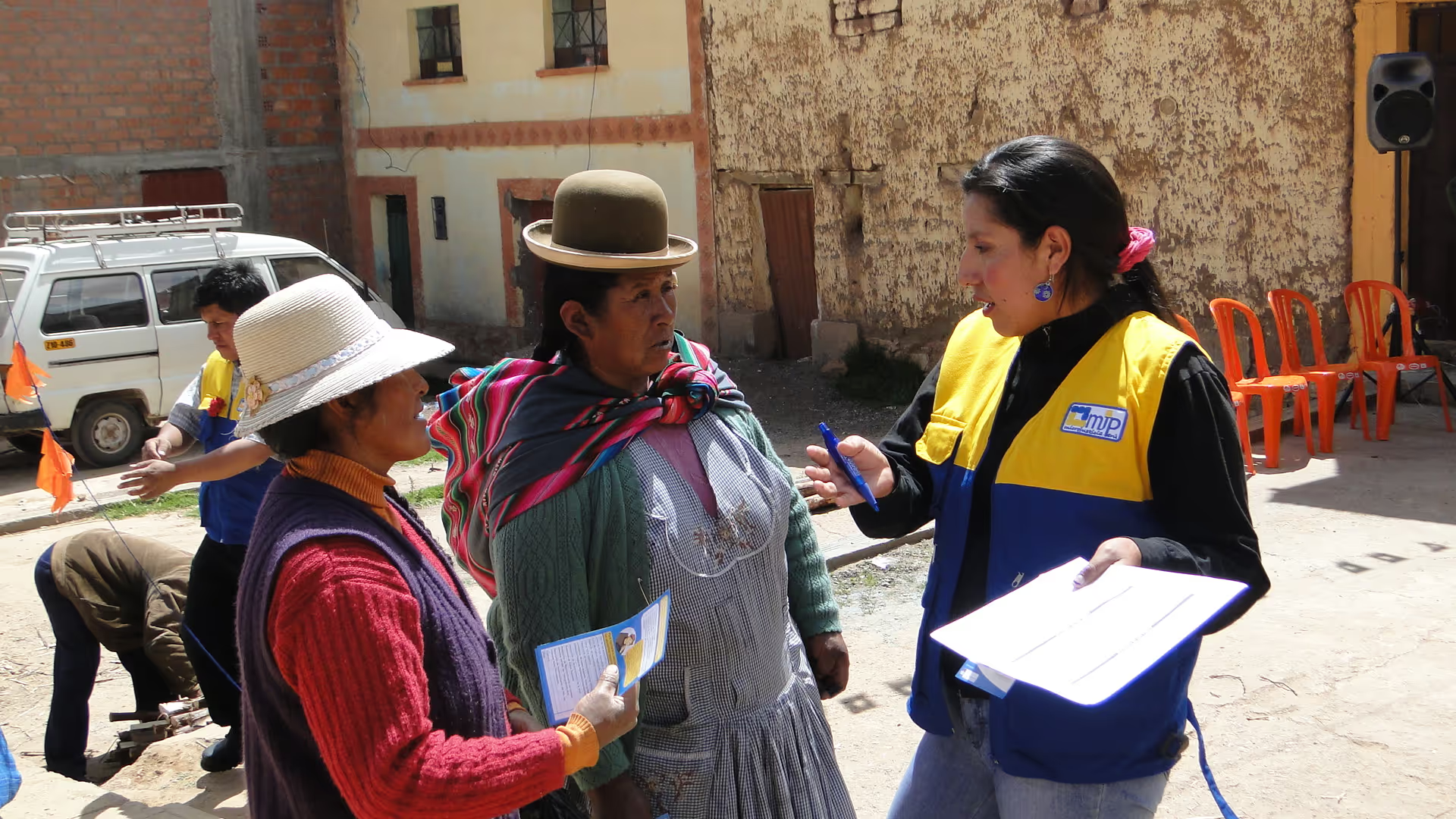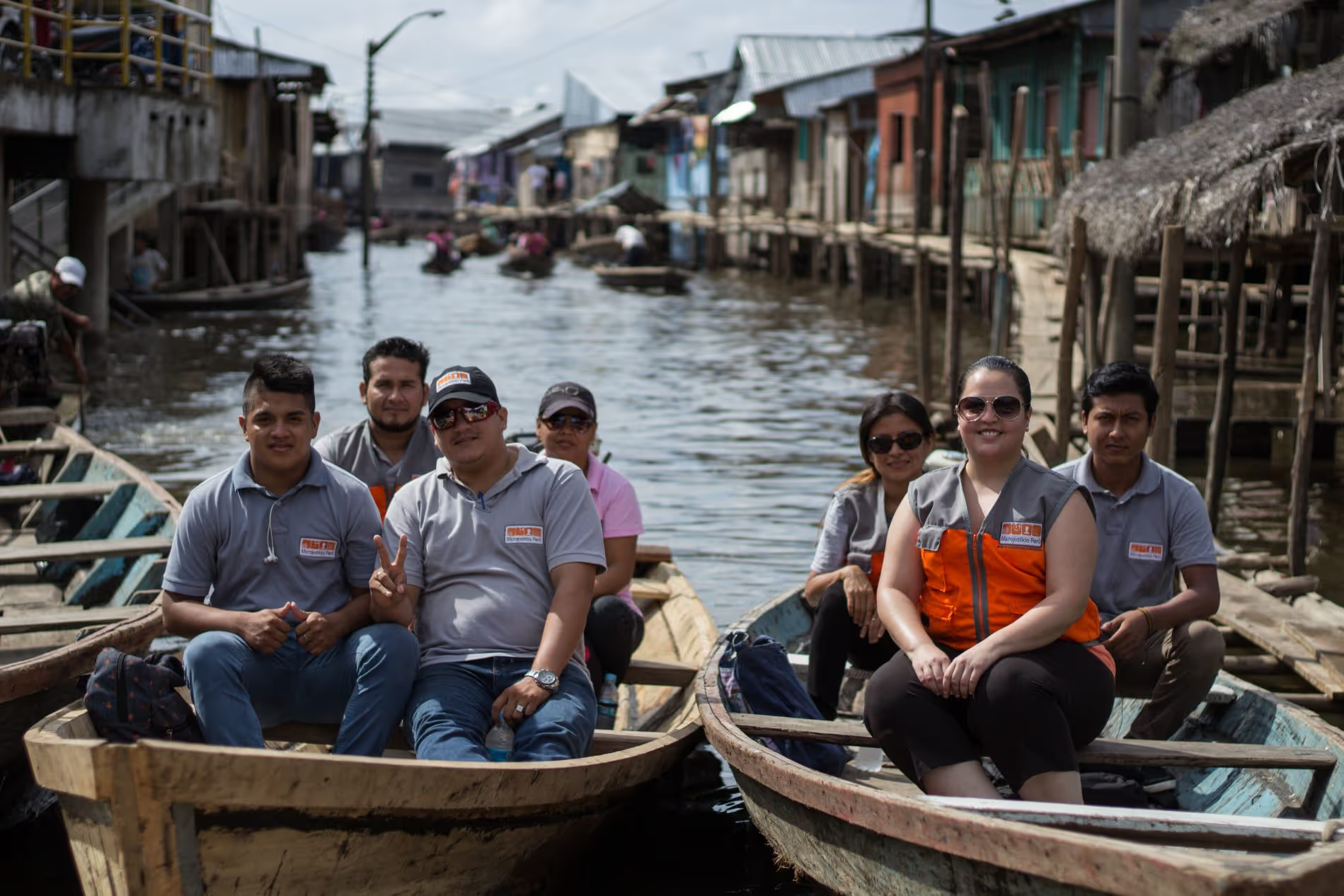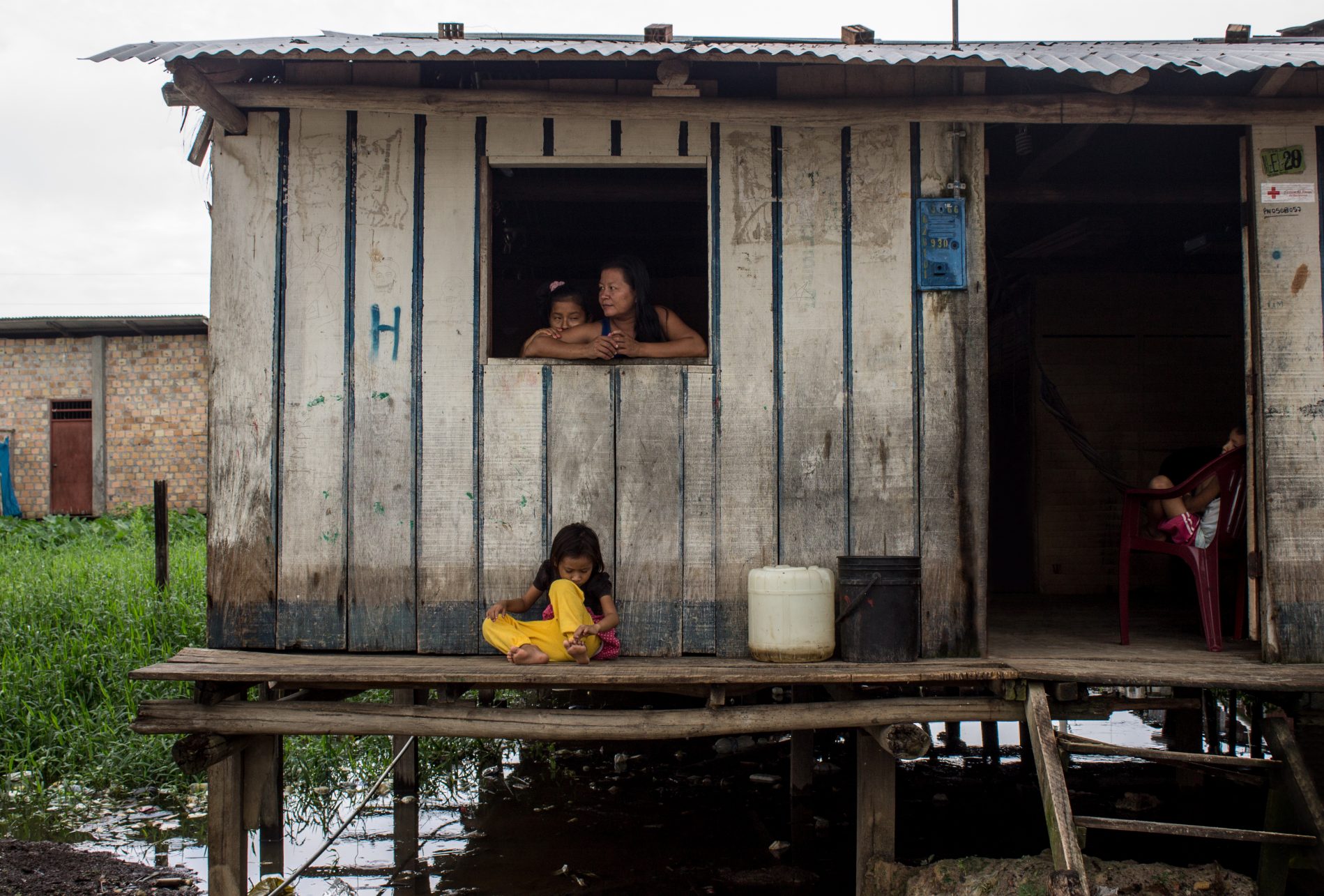Post–emergency Legal Rehabilitation Methodology and Toolkit

Project overview
Microjustice4All is piloting a legal aid Methodology and Toolkit that provides fast and effective hands-on legal rehabilitation in post-emergency humanitarian crises to help victims solve their legal issues.
Project solution
This project offers [specific solution or intervention] to tackle [challenge]. By implementing [strategies, tools, or innovations], the project aims to achieve [desired outcomes]. The approach is designed to [specific actions or methods] to bring about meaningful change in [community, region, or issue area].
Expected outcomes
This project aims to achieve [specific outcomes], such as [measurable results, improvements, or changes]. The expected impact includes [benefits to the target community, advancements in research or innovation, or long-term effects]. By the end of the project, we anticipate [specific changes or milestones] that will contribute to [broader goals or objectives].
Microjustice4All is piloting a legal aid Methodology and Toolkit that provides fast and effective hands-on legal rehabilitation in post-emergency humanitarian crises to help victims solve their legal issues, (re)obtain their legal documents (e.g. ID and entitlements such as land titles), and fill out required documentation. This will help the victims to access reconstruction loans, aid relief, and to restore their livelihoods. The Methodology and Toolkit can be used worldwide in post-emergency rehabilitation processes, so that these become more structural and permanent, based on legal security and entitlements.
WHAT IS THE HUMANITARIAN NEED?
In post-emergency situations vulnerable people become even more vulnerable: victims often loose their basic documents or need papers they never had to prove their identity, property etc., and the institutional infrastructures are often damaged, which makes access to the right paperwork even more complicated. While material aid is necessary, many victims miss out on it, as they are not able to (re)obtain legal documents that humanitarian and government agencies request and/or fill out necessary forms.
The innovation addresses the humanitarian challenge of providing victims in post-emergency situations effectively and efficiently with the legal rehabilitation aid they need, so that they can: (a) access emergency aid relief programmes and reconstruction loans, for which they need to present legal documents and/or fill out forms and other documents (for example for rebuilding their house), and (b) start rebuilding their livelihoods as soon as possible, without being limited by missing legal documents, such as identity and property papers.
WHAT IS THE INNOVATIVE SOLUTION?
The innovation involves the organisation of scalable, legal rehabilitation campaigns in post-disaster situations by international specialists, local lawyers and paralegals in the existing Microjustice network. Methods to retrieve lost documents or obtain new ones include following step by step legal product manuals, standardised forms and Case Management System (CMS), which registers all activities regarding the case. Once a case file is complete it can be processed by our case managers and lawyers, who will take it to the relevant government institution and conduct lobbying activities where needed.
The innovation will lead to incremental change as it contributes to increasing the effectiveness and sustainability of existing humanitarian efforts. All efforts are undertaken as much as possible within the infrastructure of the humanitarian agencies and loan providers, which also helps to identify beneficiaries. Through the structural legal aid provision by MJ4All, victims that would normally have difficulty solving their legal problems, (re)obtaining their legal documents/registration, and accessing aid programmes and loans, will now be able to do so and thus have much better opportunities to rebuild their livelihoods.
For example, a victim who lost their ID and land registration papers would normally not be able to access a loan or get a subsidy for lost crops. MJ4All, however, would help this victim obtain the documents and apply for the aid or the loan. This way the victim is much better protected against possible encroachment and more likely to regain their livelihood.
How does the innovation build on and improve existing humanitarian practice?
No structural methodology or tool currently exists for providing legal aid in humanitarian crisis situations. Aid workers (non-lawyers/paralegals) and teams of volunteer lawyers now often try to help affected people meet the criteria and basic documents required to obtain a specific type of aid, for instance for rebuilding one’s house. Yet, these responses are still too ad hoc, unstructured, and inefficient, and are often limited to awareness campaigns (instead of hands-on solving of the legal problems), which hampers their impact.
The Legal Rehabilitation Methodology and Toolkit will provide the humanitarian service of structural basic legal rehabilitation aid, which is currently lacking in post-emergency humanitarian aid efforts. The objective is not to provide an additional type of humanitarian aid, but instead to complement existing humanitarian efforts and contribute to their effectiveness and sustainability. A concrete example being the reconstruction of a house by a humanitarian organization after MJ4All helps the home-owner (re)obtain proof of ownership. The solution is implemented as much as possible within the exiting humanitarian relief infrastructure and in close cooperation with aid agencies.
WHAT ARE THE EXPECTED OUTCOMES?
The project expects the following deliverables/outputs:
- Baseline reports
- First version of the Legal Rehabilitation Methodology and Toolkit (containing forms and instructions for the quick scan, legal manuals, standardised procedures and forms, training materials for team members, legal information leaflets and other outreach materials, formats for advocacy reports, templates of documents for administration, digital Case Management System)
- Two reports informing on results of quick scans (Peru and Kenya)
- Two Legal Rehabilitation Toolkits adapted to the test area (Peru and Kenya)
- 6 Legal Rehabilitation Clinics in the crisis areas (3 in Peru, 3 in Kenya)
- 16 legal information campaigns (8 in Peru and 8 in Kenya)
- 20.000 victims reached, through consulting MJ staff at aid relief centres, visiting Legal Rehabilitation Clinics, participating in legal information campaigns, and listening to radio spots with legal information
- 6.000 legal consults attended and 1000 cases solved or soon to be solved
- Monthly internal evaluation reports of tests for Peru and Kenya
- Two progress reports and adjustment strategies, based on progress evaluations of performance in both test areas
- Final evaluation report on the Methodology and Toolkit
- Final version of the Methodology and Toolkit ready for scale-up and diffusion
Microjustice4All is piloting a legal aid Methodology and Toolkit that provides fast and effective hands-on legal rehabilitation in post-emergency humanitarian crises to help victims solve their legal issues, (re)obtain their legal documents (e.g. ID and entitlements such as land titles), and fill out required documentation. This will help the victims to access reconstruction loans, aid relief, and to restore their livelihoods. The Methodology and Toolkit can be used worldwide in post-emergency rehabilitation processes, so that these become more structural and permanent, based on legal security and entitlements.
WHAT IS THE HUMANITARIAN NEED?
In post-emergency situations vulnerable people become even more vulnerable: victims often loose their basic documents or need papers they never had to prove their identity, property etc., and the institutional infrastructures are often damaged, which makes access to the right paperwork even more complicated. While material aid is necessary, many victims miss out on it, as they are not able to (re)obtain legal documents that humanitarian and government agencies request and/or fill out necessary forms.
The innovation addresses the humanitarian challenge of providing victims in post-emergency situations effectively and efficiently with the legal rehabilitation aid they need, so that they can: (a) access emergency aid relief programmes and reconstruction loans, for which they need to present legal documents and/or fill out forms and other documents (for example for rebuilding their house), and (b) start rebuilding their livelihoods as soon as possible, without being limited by missing legal documents, such as identity and property papers.
WHAT IS THE INNOVATIVE SOLUTION?
The innovation involves the organisation of scalable, legal rehabilitation campaigns in post-disaster situations by international specialists, local lawyers and paralegals in the existing Microjustice network. Methods to retrieve lost documents or obtain new ones include following step by step legal product manuals, standardised forms and Case Management System (CMS), which registers all activities regarding the case. Once a case file is complete it can be processed by our case managers and lawyers, who will take it to the relevant government institution and conduct lobbying activities where needed.
The innovation will lead to incremental change as it contributes to increasing the effectiveness and sustainability of existing humanitarian efforts. All efforts are undertaken as much as possible within the infrastructure of the humanitarian agencies and loan providers, which also helps to identify beneficiaries. Through the structural legal aid provision by MJ4All, victims that would normally have difficulty solving their legal problems, (re)obtaining their legal documents/registration, and accessing aid programmes and loans, will now be able to do so and thus have much better opportunities to rebuild their livelihoods.
For example, a victim who lost their ID and land registration papers would normally not be able to access a loan or get a subsidy for lost crops. MJ4All, however, would help this victim obtain the documents and apply for the aid or the loan. This way the victim is much better protected against possible encroachment and more likely to regain their livelihood.
How does the innovation build on and improve existing humanitarian practice?
No structural methodology or tool currently exists for providing legal aid in humanitarian crisis situations. Aid workers (non-lawyers/paralegals) and teams of volunteer lawyers now often try to help affected people meet the criteria and basic documents required to obtain a specific type of aid, for instance for rebuilding one’s house. Yet, these responses are still too ad hoc, unstructured, and inefficient, and are often limited to awareness campaigns (instead of hands-on solving of the legal problems), which hampers their impact.
The Legal Rehabilitation Methodology and Toolkit will provide the humanitarian service of structural basic legal rehabilitation aid, which is currently lacking in post-emergency humanitarian aid efforts. The objective is not to provide an additional type of humanitarian aid, but instead to complement existing humanitarian efforts and contribute to their effectiveness and sustainability. A concrete example being the reconstruction of a house by a humanitarian organization after MJ4All helps the home-owner (re)obtain proof of ownership. The solution is implemented as much as possible within the exiting humanitarian relief infrastructure and in close cooperation with aid agencies.
WHAT ARE THE EXPECTED OUTCOMES?
The project expects the following deliverables/outputs:
- Baseline reports
- First version of the Legal Rehabilitation Methodology and Toolkit (containing forms and instructions for the quick scan, legal manuals, standardised procedures and forms, training materials for team members, legal information leaflets and other outreach materials, formats for advocacy reports, templates of documents for administration, digital Case Management System)
- Two reports informing on results of quick scans (Peru and Kenya)
- Two Legal Rehabilitation Toolkits adapted to the test area (Peru and Kenya)
- 6 Legal Rehabilitation Clinics in the crisis areas (3 in Peru, 3 in Kenya)
- 16 legal information campaigns (8 in Peru and 8 in Kenya)
- 20.000 victims reached, through consulting MJ staff at aid relief centres, visiting Legal Rehabilitation Clinics, participating in legal information campaigns, and listening to radio spots with legal information
- 6.000 legal consults attended and 1000 cases solved or soon to be solved
- Monthly internal evaluation reports of tests for Peru and Kenya
- Two progress reports and adjustment strategies, based on progress evaluations of performance in both test areas
- Final evaluation report on the Methodology and Toolkit
- Final version of the Methodology and Toolkit ready for scale-up and diffusion
Project delivery & updates
Stay up to date with the latest developments from this project. Here, you will find details on what has been delivered, resources created, and regular updates as the project progresses. Access key documents, reports, and other materials to see how the project is making an impact.
Resources
Tools and toolkits
LEARN MORE
